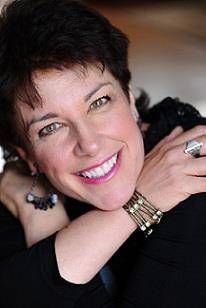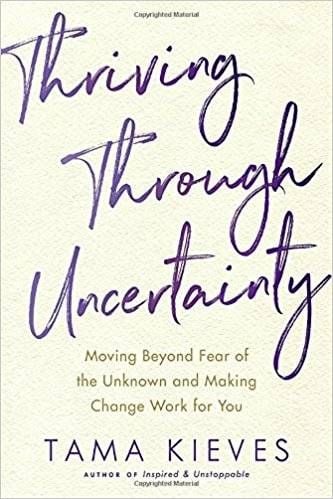Changing Careers: How to Move Past Fear of the Unknown
Advice from the author of 'Thriving Through Uncertainty'
Tama Kieves, author of the new book Thriving Through Uncertainty, remembers the moment well: She was on track to become a partner at a prestigious Denver law firm, but while on a California beach eating a bagel, wondered whether she wanted to continue living. Kieves, a Harvard Law grad from Brooklyn, felt empty and “suffocating in meaninglessness.” She couldn’t see a way out.

“I was working 900 million hours a day at my job and it was not fulfilling,” she told me. “Everyone said: ‘You’re so successful! You’ve got it all!’” They also told her: “If you’re this successful doing something you don’t love, imagine what you could do with something you do love.”
So Kieves decided then and there not only to imagine it, but to start doing it. She had long loved creative writing, so Kieves began writing poetry, which led to essays about “the journey of career transition,” which led to her first book, This Time I Dance!: Creating the Work You Love, which she self-published in 2002.
Today, the self-described “mild mannered Jewish rebel” and “mojo catalyst” in her 50s is author of four bestselling books, an inspirational speaker, a career transition expert, “success” coach and a faculty member of the Omega Institute, the Kripalu Center for Yoga and Health and the Esalen Institute. She has taught A Course in Miracles, a program about choosing love instead of fear, for 25 years.
I asked the Denver-based guru for her advice to women and men in their 50s and 60s who’d like to change direction but feel stymied by fear of the unknown. Highlights:
Next Avenue: What are you trying to teach people?

Tama Kieves: Who we really are is always inside us.
When I was in high school, I loved creative writing, but I grew up in a Brooklyn orthodox Jewish household. ‘You're going to write? You’re going to starve!’ It was not an acceptable path, so I squelched those desires to take the practical, secure path.
And how did you get off that path?
For me, it happened through pain. People say I’m courageous; it wasn’t courage, it was desperation.
What happened when you were on that beach, watching the waves and eating a bagel?
It was the freest I had been in years. I realized the bagel cost 50 cents and the ocean was free and thought to myself: ‘Maybe I don’t need a gazillion dollars to be happy.’
What do you mean by ‘thriving through uncertainty?’
Part of what it means is that we always are living our lives trying to get out of uncertainty. ‘If a check comes, I’ll be OK... If my diagnosis is resolved or my daughter marries the right person, I’ll be OK.’ We’re all trying to get somewhere else and find certainty. But life is full of uncertainty.
If you are an artist or an entrepreneur or a visionary, you are doing something different in the world. By definition, you are facing uncertainty.
I want to encourage someone to believe in themselves again, to choose again, to give themselves more love, to take another chance.
Is thriving through uncertainty different for people in their 50s and 60s than for younger people?
As a young person, when you’re considering taking risks, you may face uncertainty, but feel you have nothing to lose. ‘Let’s do a road trip with 10 dollars!’ They have an ease through ignorance.
For our age group, we have more experience facing uncertainties that we can draw from. But I will say that even when we face uncertainty, it always seems new.
Is thriving through uncertainty different for women than for men?
That’s an interesting question. A lot more women come to my workshops, and men tend to seek me out for one-on-one coaching. They don’t feel as comfortable sharing their uncertainty with a group.
Women are more comfortable living with uncertainty than men. Women have learned how to nurture more, and this is a path of self-nurturing.
Some people in their 50s or 60s want to change careers but they’re paralyzed financially. They think they can’t afford to do it. What do you tell them?
The first thought that jumped into my mind is: You can’t afford not to do it.
I was making a good amount of money as an attorney and it got to the point where, sadly, I didn’t want to live any more. With that kind of depression, all the money in the world wouldn’t make a damn bit of difference.
If you’re not doing something you love, if you’re in a soul-sucking situation or your job is killing you, that’s a health risk over time.
Also, it doesn’t have to be either/or. You don’t have to make a leap and become an artist, or save the whales. If you have a job you can’t leave or you want to save money, you can save the whales on Wednesday nights. Or take a screenwriting class Saturday mornings.
Start doing something you love now and it will change your brain chemistry. You will be more alive and happy than you have ever been. It may make you better at your job or convince you that you only get so many years on this planet and that you want to finally follow your dreams.
It doesn’t mean you’ll be happy all the time, but at least you’ll know you are on your path.

So when you changed careers and took a big pay cut, you were really investing in yourself?
Right. It was counter to what I was supposed to do.
Nowadays, there is so little security in life anyway. Life is precious and you don’t know how long you have here. If you have a dream — maybe you wanted to dance or help children — that will always make your life richer than anything else ever could.
What’s your advice for people in their 50s or 60s who want to make a career change but have the fear of the unknown?
The first thing to do is just explore something you love now. Maybe take a class or hire a coach or take a workshop. It will give you confidence. Take a tiny step.
Second, invest time, money and energy in creating some kind of support for yourself. Anything that increases your sense of safety or faith. I believe in finding a spiritual path, but I’m not advocating for any particular religion. It might be self-help. It could be meditation or exercise. Anything that gets you in touch with the deeper you. It could be nature, if you feel good in nature and that makes you feel more connected or safe.
And don’t try to figure everything out. You never will. Just experiment. Don’t put pressure on yourself.
You write that ‘uncertainty is your new best friend.’ What do you mean?
Yes, it’s your best friend. I also call it a superpower because in some ways it’s going to force you, or encourage you, to make other choices you might not have made before.
It encouraged me to listen to my own instincts. I’ve been on a spiritual path of deciding to trust and believing there is something else guiding me to do things like meditating or journaling — to listen to myself more than I ever would have.
You say ‘the greatest life is the life we didn’t plan.’ Why?
Because you can’t plan an inspired life; I didn’t plan this life. Being on partnership track and dropping out of everything was not the plan, believe me. Yet it has been the most incredible adventure, beyond anything I could have imagined. That’s not to say it didn’t have challenges.
I didn’t know I had this calling in me; even though now I speak to thousands of people at a time, my intention was to save my own damn life.
When I coach people, I see all the time that when they start doing what they love or become who they are, it’s amazing what’s inside of them.
You recommend ‘sacred listening.’ What’s that?
Sacred listening is not jumping to conclusions. If you get an instinct that you want to be a coach to youth, it means not immediately jumping on a computer to see how much they make or what education they need. You need to be with that feeling and be with that instinct. Where you start off may not be where you end up.
You say you hunt for “inspired moments.” What are they and why are they so valuable?
I’m a speaker and a lot of times, I’m not getting invited to a conference and can get discouraged. I feel like I’m never going to make it and start beating myself up. But with inspired moments, I might remember a moment when I was speaking and filled up a room and I saw hope in their eyes. That will fill me up and give me courage.
I want to ask you to talk about three practices you recommend. The first is called ‘inspired self-dialogues.’ What are they and how do you do this?
It is for me one of my go-to practices: I do journaling, which is great if you have a busy mind or you are fearful or you have anxiety and are trying to come up the answer and everyone says ‘relax’ and you can’t and you want to punch them.
There are different ways to do it. You may have a loving person in your life — your mother, husband, or a college professor — imagine that voice and that you’re writing to them.
For me, it has been such an extraordinary technique; it teaches you that no matter what, you have wiser counsel inside you. Sometimes it helps to write out your fears.
And you tell people who feel they aren’t making progress to create a 'win list.' What’s that and how does it help?
Some people feel like they’re never doing enough. A win list focuses you on what is working. Write out 10 wins you have every day: [such as]I was kinder to my husband when he was surly. Any positive actions. If you are normally depressed for 30 minutes in the morning but this morning, it was only 25 minutes, I’d put that down as a win. I try to reinforce things that no one will ever see.
And you also recommend freewriting. What is that?
Freewriting is a journalizing technique where you’re writing and not editing. So literally, you keep your pen moving or your fingers on the keyboard moving without thinking about it. It’s like a stream of consciousness. Do this as a timed exercise, for 15 minutes. The beautiful thing about not editing is you’re not judging. You might surprise yourself to see the energy that comes out.


